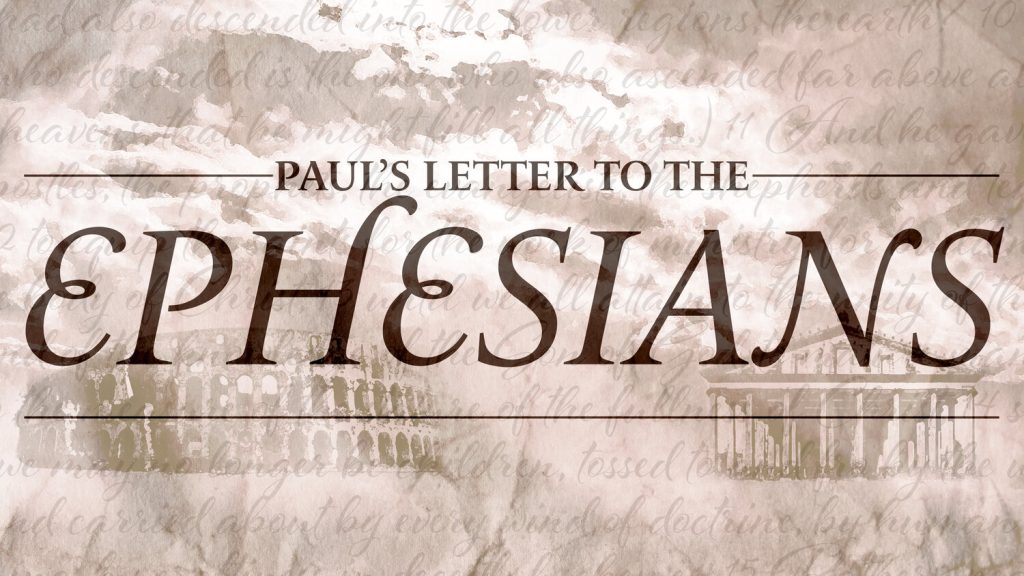This Tuesday we will discuss Ephesians 2:1-10. Here Paul writes about the Life found in Christ Jesus and that we are saved by grace, not by works.
Life and Death: (v.1)
Paul opens this reading with the statement “You he made alive when you were dead through the trespasses and sins.” v.1. This idea of life and death is grounded in the Scriptural understanding of who Jesus is. In John’s Prologue found in John 1:1-18 and in Paul’s Christological Hymn found in Colossians 1:15-20, we are told that Christ is the agency through whom all things were created and in whom are things exist. Nothing exists, except that which exists by and through Christ. (This idea goes back to the identification of Christ Jesus as the Hellenistic Logos which was seen as the rational organizing principle of the universe.)
In his book, On the Incarnation, St. Athanasius (296-373) writes that as humans move toward God, we become more alive and more existent, whereas when we move away from God we move toward death and a pre-created non-existence. (Good is being, and evil is non-being.) Sin corrupts our human nature so as to move us inextricably away from God and toward death. See, Chapter I, On the Incarnation. (Athanasius’s work is the basis for C.S. Lewis’s The Great Divorce which contrasts the unrepentant ghosts of Grey Town with the glorious and substantive inhabitants of heaven.) This is the life/death dichotomy Paul writes about in v.1. Because Christ is the agency of creation and existence, he is the only one who is capable of changing our trajectory back toward God and thereby making us alive when we were dead through sin.
The Prince of the Air: (v.2)
For Athanasius, one of the results of sinful corruption is that we begin to worship not only idols, but demons themselves, and call them gods. Ch. III, para.11. The chief among these demons is the devil who fell from heaven and thereby inhabits and blocks the area between earth and heaven. Luke 10:18. In looking at Ephesians 2:2, Athanasius writes “the enemy of our race, the devil, having fallen from heaven, wanders around these lower airs . . . and works illusions in those who are deceived and attempts to prevent them rising upwards . . . yet Christ came that he might overthrow the devil, purify the air, and open up for us the way to heaven.” Ch. IV, para.25. Therefore, when Christ was lifted up on the Cross into the air “he purified the air from the prince of the air and all diabolical plots of all demons and blazing the trail he made anew the way up to heaven.” Id.
Sons of Disobedience: (v.2)
The Prince of the Air is supported by the Sons of Disobedience. Throughout the Old Testament, ne’re-do-wells were called the “Sons of Belial” or “sons of worthlessness.” For example, Eli’s sons were “Sons of Belial” and their destruction was Samuel’s first prophecy. 1 Sam. 2:12, 3:12-14. By the time of the Dead Sea Scrolls (c.2nd c. B.C.), these Sons of Belial had become the army of the forces of darkness. In the War Scroll, the Forces of Darkness alternatively called the Sons of Belial do battle with the Forces of Light led by the Archangel Michael. This is Paul’s vision in this verse. There is an apocalyptic battle between Death and Life, with the forces of death being led by the Prince of the Air and his army the Sons of Disobedience.
The Battle: (v.3)
Going back to St. Athanasius, we can see that this battle being led by the Prince of the Air, takes place in every human heart – the passions of the flesh and the desires of the body and mind. v.3. These are the Works of the Flesh that Paul describes more fully in Galatians 5:19-21. The Price of the Air seeks to incorporate us into his army. The children of disobedience soon become the children of wrath. It is not that we are expressly punished by God for giving into the passions, but that, by their very nature, the passions lead us into death and non-existence as a natural consequence.
Dinner is at 6. The menu is sloppy joes. Discussion at 6:45. Hope to see you here!
Lift up your heads, O gates;
lift them high, O everlasting doors; *
and the King of Glory shall come in.
“Who is this King of Glory?” *
“The Lord, strong and mighty,
the Lord, mighty in battle.”
Lift up your heads, O gates;
lift them high, O everlasting doors; *
and the King of Glory shall come in.
“Who is he, this King of glory?” *
“The Lord of hosts,
he is the King of glory.”
Psalm 24: 7-10


Pingback: Epesians 5:6-20, Children of Light – Ancient Anglican